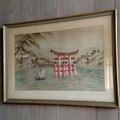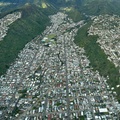Today, talk of his poker gang’s tanomoshi has made Dad uncharacteristically nostalgic, prompting him to reminisce about this group of seven lifelong friends who, over the years, had dropped to six and then five, with the deaths of Morimoto-san and Fukuda-san. The surviving members continued to play until Tokunaga-san had to bow out because of stomach cancer, which required months of brutal chemo and radiation treatments. The group remained in limbo until he had passed, prompting a decision to be made: With just four of them left, did they want to continue playing and, if so, whom should they invite to join?
After thinking about it for nearly a year, they agreed to end their poker nights. None of them could fathom adding a new player and, anyway, driving at night had become increasingly difficult for the men, who were then all retired and in their seventies. Instead, the remaining four switched to meeting weekly at the Ala Moana Center, the large outdoor shopping mall where they could accomplish their daily exercise by walking around the different levels, before retiring at the McDonald’s in the food court for a cup of coffee. But eventually the four men had dwindled down to two: Tanaka-san and my father.
This was ironic because, of the entire group, those two men had been the biggest rivals. Yamamoto-san once told me that the most fiercely competitive poker hands were when Tanaka-san and Dad were the last two remaining, with each vigorously betting and raising against each other. Neither of the men was going to let the other get the better of him but, from what I could gather, it was usually Tanaka-san who came out on the winning end of those battles.
This irked my father to no end, and he would sometimes complain to me that Tanaka-san was always so damn lucky. I came to realize, though, that Dad simply wasn’t as adept at poker as Tanaka-san was, partly because my father often had trouble pulling off a convincing bluff.
Over the years, the poker gang must have had its fair share of disagreements, but my father was always discreet about any fights they might have had. He might, on a rare occasion, let loose a stray remark that hinted at some vague displeasure with someone in the group — as in, “sometimes I really don’t understand Morimoto-san” — but then he’d quickly switch subjects.
Some of that, I guess, was a manifestation of gaman, the Japanese approach to life that calls for enduring hardships and difficulties without complaining. Gaman was what he always counseled me, whenever I had trouble at work or with my own relationships. But I also think it was my father’s way of saying how much he treasured these friendships, that he would always work out any differences quietly behind the scenes.
Yet, after the poker gang had shrunk down to just him and Tanaka-san, things finally came to a head. Something happened between the two men a couple years ago, and from that day on they refused to see each other. Mom had encouraged a rapprochement, in part because she didn’t like that she now had Dad at home, puttering around the house, 24 by 7.
“At least I could catch a break once in a while when Dad would go holo-holoing with Tanaka-san,” she complained to me, “but now he’s always here.”
My mother no longer had any time to herself, to cook, do household chores, tend to her orchids, and watch her afternoon soap operas uninterrupted. When her patience had stretched to the breaking point, she begged me to intercede, but whenever I tried to ask Dad about his fight with Tanaka-san, my father would just shake his head and redirect the conversation.
Now, though, my father seemed receptive to talking about that distressful subject. Perhaps it was the poker table and our reminiscing about the tanomoshi, but Dad was finally willing to explain what caused the big falling-out.
According to him, he and Tanaka-san had planned to take a day trip to the North Shore, with my father driving. But when Dad went to pick him up, Tanaka-san had forgotten about the date so Dad had to wait for him to get ready. And then when they were finally on the road, Tanaka-san kept on telling Dad what route they should take, which sights they should stop at, where they should have lunch.
“He’s always been so bossy,” Dad complained. “I’ve never liked that.”
So that was it: not one unforgivable breach of loyalty or shocking betrayal of friendship, but instead a simple lapse in memory, a few unasked-for directions, and an ill-timed suggestion that had caused the fracturing of a decades-long friendship. In response, all that I could say was, “Even if it wasn’t your fault, why can’t you just apologize for the sake of your friendship? After all, you guys go way, way back.”
“Humph, maybe too far back.” And with that, my father left the dining table, leaving Mom and me to clear the dishes.
After lunch, while Dad napped, I went out to the garage to take a close look at the poker table: its green-felt top, built-in trays for chips, and detachable legs. It was usually stored in the garage, but on game nights Dad would set it up in the middle of the living room, with all the other furniture pushed against the wall. Before the guests would arrive, he’d ceremoniously unpack the chips and lay out two decks of new Bicycle cards, one blue and the other red.
For the first time, I now noticed that the table wasn’t eight-sided, like standard poker tables. Instead, Tanaka-san had constructed the wooden surface to be seven-sided, with a hidden seam so that it could be folded in half for transporting. I measured all of the sides and found that they were perfectly equal.
How in the world did Tanaka-san do that? It would have been so much easier to build an octagonal table because each half would then contain four seats.
But Tanaka-san had gone to the distinct trouble of making the table heptagonal, as if to say, “We are a gang of just us seven, exactly seven, no more and no fewer.”
The table may have seen countless hands of poker played but only in the game’s purest form: five-card draw, with no wild cards. I once asked Dad if that ever got boring, whether instead they might have sometimes tried Texas hold ‘em or seven-card stud, and he looked at me as if I’d asked why the seven men had never practiced ikebana together. The men were also creatures of habit when it came to alcohol, always drinking beer, although on special occasions — someone’s recent birthday or wedding anniversary — they’d have whiskey, but always on the rocks or neat with just a splash of water. Nothing fancy, just a night of cards with good friends.
Interestingly, I never once heard the men talk anything about the war. They would playfully goad each other, brag about their children, and discuss the latest baseball news (six were diehard Dodgers fans, while Fukuda-san favored the Giants), but they would never talk about what happened on the brutal battlefields in Italy and France. It was only much later that I would learn that one of them — the unassuming Morimoto-san — had been awarded a Bronze Star.
“Do you want it?” Dad startled me as he approached from behind.
“You know I don’t play poker.”
“But what about James?” Dad asked, referring to my long-time partner. “Doesn’t he play?”
“Yeah, but only online. Are you really sure you want to get rid of it?”
Dad didn’t say anything as he kept staring at the table, lost in thought. I had no idea what was going through his mind. As I ran my fingers over the polished wooden rim of the table, I told my father how badly I felt about him and Tanaka-san. A long silence ensued and, just when I thought my father was about to leave, he said, “Before it was okay when there were others for Tanaka-san to boss around. But now it’s just me, and I don’t like it.”
“Geesh,” I shook my head. “You guys are such frenemies.”
“What’s that – ‘frenemies’?”
“It’s like you’re friends but you’re also enemies, so ‘frenemies.’” I can’t believe what I’d just done, trying to explain to my father a term from “Sex and the City.”
“Yes, frenemies.” Dad nodded, his lips breaking into a wry smile.
“It’s just a made-up word. In Japanese it might be ‘abudachi,’” I said, combining two of the few Japanese words I knew: “abunai,” or dangerous, and “tomodachi,” for friend.
It took a few moments for Dad to figure out my new portmanteau. “Yes, abudachi,” he laughed. “Tanaka-san is very abudachi.”
“When was the last time you saw him?”
“A while ago. He and I don’t drive anymore, so it’s not like we can just see each other anytime we want.”
Of course my father was just making excuses, so I told him, “You know you guys aren’t getting any younger. It’d be really bad if something happened to one of you without clearing up any bad feelings.”
Dad shook his head and kept staring at the poker table, while I slowly rolled it neatly back into the corner. I figured that this was as good a time as any to ask, “Why don’t we visit him? I can take you. In fact, it would be great for me to see him again too.” I was about to add something else, but my father had already lost interest in the conversation and was filling the lawn mower with gasoline from a metal can.
I had assumed the discussion was closed but, later that afternoon, after he and I had finished mowing the front and back lawns, Dad surprised me by asking if I’d be free next weekend because he was thinking we could drive to Tanaka-san’s place. I was elated and told him that either Saturday or Sunday would work for me. Actually, I was even willing to take a day off from my job during the week if that would be best for Tanaka-san.
Dad made the call to his friend early that evening, but he didn’t use the phone in the kitchen or living room. Instead he secluded himself in his and Mom’s bedroom. I felt for him — was the call so difficult and personal that he needed absolute privacy? “Honestly, those two men,” Mom shook her head, “just like little boys sometimes.”
When Dad returned to the dining room, where Mom and I were setting out dishes for dinner, he announced to me, “It’s all set. Next Saturday then. I told Tanaka-san we’d be at his house at one o’clock and then we can head over to the Zippy’s near Kahala Mall for lunch.” As Dad went to the kitchen to grab a beer, Mom sneaked a big smile at me.
*“The Poker Table” was originally published in The Gordon Square Review (issue 12).
© 2023 Alden M. Hayashi






